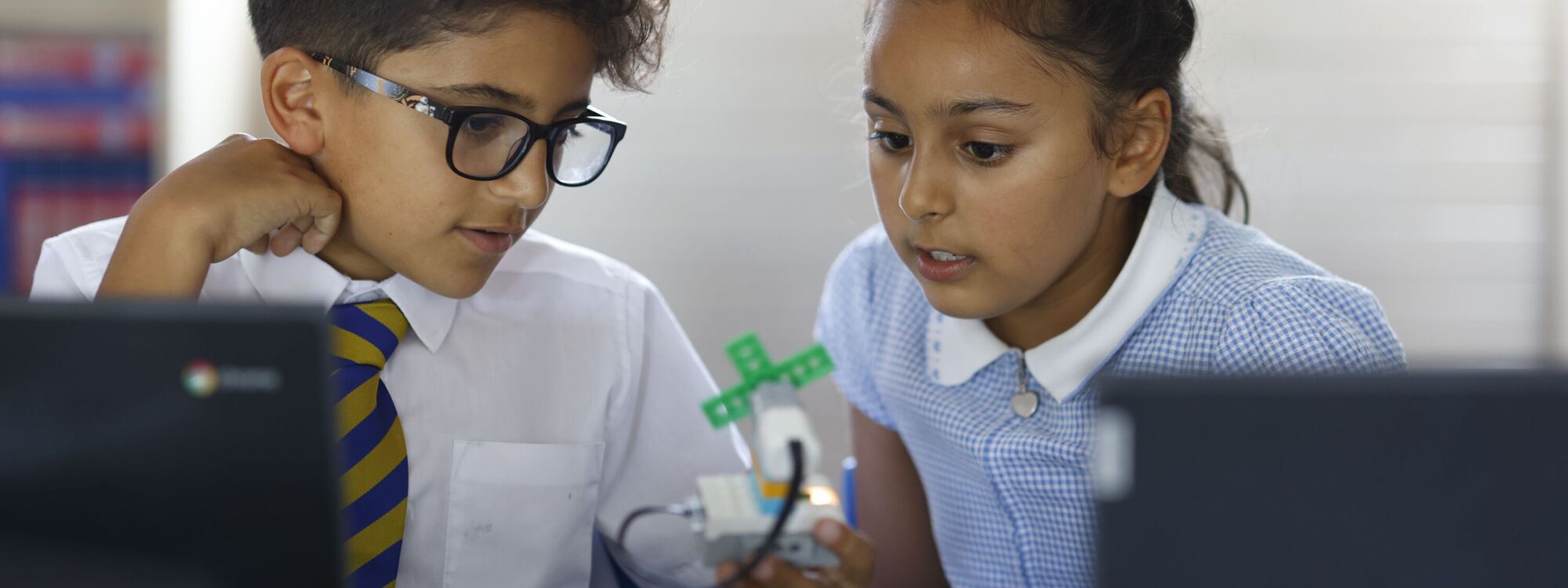
- Home
- Parents
- Online Safety
Online Safety
At Breakspear our children are taught to keep their personal information private and to report anything that has made them uncomfortable or unsafe to an adult they trust as soon as possible.
We believe it’s important to engage with parents and carers about online safety risks and to ensure together that our children are safe and equipped to navigate any challenges they may face online. It can be difficult as parents to keep up-to-date with the latest issues in E-Safety but we try to inform parents of anything relevant via the app or website.
Top Tips for Keeping Your Child Safe Online.
- Encourage your child to close down any app, chat, video or images that upset them or make them uncomfortable, and tell you about it.
- Make sure they know that you can never be completely sure who you are talking to when it's being done over the internet.
- Don't allow them to use mobile devices or computers with internet connectivity in a room away from you.
- Encourage your child to question how real or trustworthy online challenges are when they appear so they can learn to ignore them and not engage.
- Insist on knowing usernames and passwords.
- Do not allow them to open social media accounts which usually have an acceptable usage age of 13 (Facebook, Instagram, Snapchat, TikTok).
- Regularly check their mobile devices to see what apps have been downloaded and whether these apps have chat functions, video chat or image sharing functions. If they do, you need to monitor them very closely.
- Check their browser history after use.
- Install child security software to limit search functions and filter out some inappropriate material.
- Teach your child to look for the privacy settings on every app and website that they install/make an account on. Their privacy settings should be locked down as tightly as possible- especially ensure that any functions which show your child's location or allow strangers to contact them, are switched off.
Top Tips for Responding to Online Issues.
- Give children opportunities to speak to you if they are worried– It’s important to give your child time, in which they can talk to you about online issues that may concern them.
- Talk to children about reporting and blocking –It’s important to give your child strategies to deal with online content or contact which concerns them. This could be something they have witnessed or directly experienced. Social media, games and video platforms offer reporting and blocking tools which you can encourage your child to use.
- Talk about peer pressure – Children can sometimes be drawn into viral challenges because it is what all their friends are doing or seem to be doing and saying ‘no’ can seem like a very hard thing to do. Discuss with your child the repercussions of this.
- Signpost to support – It’s important to ensure your child knows where they can go to for support. This could be directing them to the appropriate members of staff in school as well as signposting to key helplines.
- Keep calm and do your research -When viral challenges are mentioned by your child or appear in the news, it’s important to make sure you remain calm and have all the information you need to support your child effectively.
- Avoid naming concerning or dangerous viral challenges – Naming a viral challenge to your child, parents or carers could run the risk of spreading the reach of the challenge further.
- Avoid showing any upsetting or scary content – It’s important to remember that even when something does go viral online it doesn’t mean that all children have seen or heard of it.
- Reporting - If you need help with reporting an incident there are a number of organisations that can help. Visit: https://saferinternet.org.uk/guide-and-resource/need-help
- Being proactive- It’s important as parents and carers to be proactive and engaged with online safety risks. It is important to follow up on information given to your child and that we are all sharing the same advice both at home and at school to keep our children safe.
Useful Links
Supporting young people who have experienced bullying online
https://saferinternet.org.uk/online-issue/online-bullying
De-escalating and responding to harmful online challenges
https://saferinternet.org.uk/online-issue/online-challenges
Helping parents and carers keep their children safer online
https://saferinternet.org.uk/online-issue/coerced-online-child-sexualabuse
Staying safe while playing games online.
https://saferinternet.org.uk/online-issue/gaming-2
Protecting young people from inappropriate online content.
https://saferinternet.org.uk/online-issue/parental-controls
Supporting professionals working with children and young people, with any online safety issue they may be having
https://saferinternet.org.uk/professionals-online-safety-helpline
Information on how to make a report.
https://www.childnet.com/resources/how-to-make-a-report
A list of helplines for young people who are facing online challenges.
https://www.childnet.com/parents-and-carers/need-help
Tips and key advice for primary aged pupils which can be explored
https://www.childnet.com/young-people/primary
A collection of stories for younger children teaching them the importance of being a good online friend and being a critical thinker when online.
https://www.childnet.com/resources/digiduck-stories
Staying safe online when using social media



